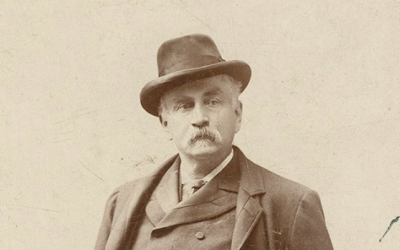J. Sterling Morton served as secretary of Nebraska Territory from April 30, 1858, until May 19, 1861. For five months of that time (December 5, 1858, to May 2, 1859), he also was acting governor. According to James Olson, Morton’s biographer, Morton’s term as secretary was marred by an ongoing struggle over the disposition of the public printing, a struggle that involved another well-known Nebraskan, Robert W. Furnas.
According to Olson,”officials of the territories normally had about $7,500 to expend upon printing. About $2,500 of this usually was divided between two of the newspapers, edited by the [party] faithful, for incidental printing; and about $5,000 was reserved for the laws and journals. Such sums loomed large in the eyes of editors, who, . . . often received little besides farm produce in return for subscriptions.” The printing funds were allocated from congressional appropriations, and the secretary of the territory was responsible for disbursing them (although it was customary for him to follow the wishes of the territorial legislature in selecting the public printers). “The legislatures, usually well-loaded with editors, were jealous of what they assumed to be their prerogatives.”
Morton, however, was determined that he, as secretary, would control the public printing. He appointed T. H. Robertson of the Omaha Nebraskian and Thomas Morton of the Nebraska City News, “they being the oldest and most widely circulated and reliable Democratic Journals in Nebraska,” as public printers for the territory. Robertson and Morton handled the legislature’s incidental printing–until two days before adjournment, when the legislature elected Robert W. Furnas, editor of the Nebraska Advertiser at Brownville, as public printer. The act seemed to Morton an act of defiance, especially because Furnas (although a fellow Democrat) was a critic of Morton.
The dispute dragged on throughout Morton’s term as secretary. Morton refused to recognize Furnas as the public printer, a course tacitly recognized by the territorial comptroller, who authorized payment for bills submitted by Morton’s printers. Although Morton was criticized, the precedent he set was followed by other territorial secretaries until statehood was achieved.



